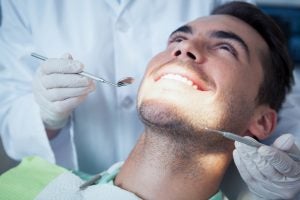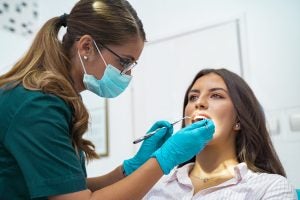-
What is General Dentistry?

When following the recommended schedule, you’ll see your dentist twice a year. That’s more than you see other doctors, because while most doctors tend to the sick, dentists are primarily concerned with preventing problems. Most dentists practice general dentistry, and at a routine visit the dentist- with the help of dental assistants- will examine the mouth, provide a professional cleaning, and discuss the patient’s health and oral hygiene. But that’s not the entire scope of general dentistry. Let’s take a look at all the things that general dentists do.
- Preventive services are the mainstay of a general dentistry practice. Regular exams and professional teeth cleanings help patients maintain good oral health, as do preventive treatments like dental sealants. The dentist can also fit patients with active lifestyles for custom-made mouthguards.
- When there’s a problem, dentists provide restorative services. One of the most common restorative treatment is a filling. The dentist removes tooth decay and puts a filling in the damaged tooth. However, that’s not the only restorative procedure provided by general dentists. They can also provide treatment for dental trauma, like when a tooth has been broken, knocked out, or loosened. Dentists can also diagnose and treat tooth pain and gum disease, offer treatment for missing teeth, place crowns or bridgework, and fit patients for dentures. Some general dentists can also perform advanced treatments like root canal therapy, orthodontics, and dental implants.
- Often, general dentists perform cosmetic procedures to help improve their patients’ smiles. Teeth whitening, cosmetic bonding, and even porcelain veneers can be provided by your dentist’s office.
- General dentists are concerned with their patients’ overall health. Your oral health impacts and reflects the health of your body. For instance, infections in your mouth can impact your cardiovascular health, and people with diabetes are more susceptible to periodontal (gum) disease. General dentists can identify issues with your teeth than can have an impact on your health and offer treatment or referral when necessary. One condition dentists can screen for is obstructive sleep apnea, which can sometimes be treated with an oral appliance. General dentists are also qualified to provide nutritional counseling, advice about tobacco cessation, and general health and wellness information. They can also screen for oral cancer.
What qualifications are required for general dentistry? Dentists must successfully complete their undergraduate education and four years at an accredited dental school. They then have to fulfill testing and continuing education requirements of state licensing boards. Dentists may have the initials DMD or DDS following their names, but they all have the same education and training.
At Park 56 Dental Group, we offer pediatric, prosthodontics, endodontics, oral surgery, Invisalign®, emergency, and sedation dentistry, all at the highest level of treatment. We serve the Midtown, Central Park, Upper East Side, Park Avenue, and all surrounding Manhattan and New York areas, with a patient-centered practice that has hours to fit your schedule. Schedule your complimentary consultation today by contacting us online or calling us at (212) 826-2322.
-
Dental Terms to Know

When you visit the dentist, you may sometimes hear terms you don’t understand. This is not unusual, because dentists often use very specific medical terminology that is unfamiliar to most patients. If you aren’t sure what the dentist is talking about, you should always ask questions, so that you’ll understand what’s going on with your mouth. In the meantime, here’s a list of common dental terms that are good to know.
- Abrasion: Tooth wear caused by forces other by eating.
- Abutment: Tooth or implant supporting a dental prosthesis.
- Anesthesia: General anesthesia is a controlled state of unconsciousness, intravenous sedation is depressed consciousness that’s medically controlled, and local anesthesia, also called regional, is the loss of sensation without the loss of consciousness.
- Arch: An upper or lower denture.
- Bicuspid: Premolar tooth with two cusps.
- Bilateral: Occurring on both sides.
- Bonding: Composite resin applied to a tooth to change its color or shape.
- Calculus: Hard deposit of mineralized material on crowns or the roots of teeth.
- Composite: Restorative material made of a mixture of parts.
- Dentin: The inner layer of the tooth, protected by enamel and encasing the tooth’s pulp and nerve.
- Dry mouth: When the mouth doesn’t produce enough saliva- untreated, it can lead to increased levels of tooth decay and mouth infections.
- Enamel: Hard outer layer of the tooth, made of minerals.
- Excision: Surgically removing bone or tissue.
- Extraction: Removing a tooth or tooth parts.
- Fluoride: A natural mineral that makes the tooth’s exterior resistant to decay.
- Implant: A permanent replacement for missing teeth, surgically placed in the jawbone to anchor replacement teeth, a dental bridge, or dentures.
- Invisalign®: Clear, removable, dental aligners for mild to moderate orthodontic issues.
- Laser dentistry: Lasers are used for tooth decay removal, gum disease treatment, root canal therapy, and teeth whitening.
- Oral surgery: Dental specialty that corrects problems or damage to the teeth, mouth, and jaw.
- Periodontal disease: Gum disease. Gingivitis is an early stage.
- Plaque: Sticky film that forms on teeth as bacteria breaks down that causes decay if not removed.
- Radiograph: X-ray
- Root: Portion of the tooth located in the socket.
- Scaling: Removal of plaque, calculus, and stain from teeth.
- Sealant: Plastic resin applied to the biting surfaces of molars to prevent caries.
- Sedation dentistry: The use of medication to help patients relax during dental procedures.
- Tartar: Hardened plaque that can only be removed by scaling.
- TMJ: Temporomandibular joint, the hinge mechanism between the base of the skull and the lower jaw.
- Veneer: Tooth-colored material attached to the tooth surface.
At Park 56 Dental Group, we offer pediatric, prosthodontics, endodontics, oral surgery, Invisalign®, emergency, and sedation dentistry, all at the highest level of treatment. We serve the Midtown, Central Park, Upper East Side, Park Avenue, and all surrounding Manhattan and New York areas, with a patient-centered practice that has hours to fit your schedule. Schedule your complimentary consultation today by contacting us online or calling us at (212) 826-2322.
-
How Often Should You Be Going to the Dentist?

How often do you see your dentist? About one hundred million Americans skip out on regular dental checkups, even though seeing a dentist regularly is vital for good oral health. Your dentist probably encourages you to come twice a year, but is that really necessary?
Truthfully, there’s little research supporting the twice a year recommendation. So, how often should you be going to the dentist? It depends on a few factors. Some people need to go to the dentist more than twice a year. This high-risk group includes pregnant women, smokers, people prone to plaque build-up or cavities, those who have gum disease or diabetes, and anyone with a weak immune response. People who practice excellent oral hygiene and show no signs of gum disease or cavities may be able to get away with going to the dentist less often than twice a year, but that is something to discuss with the dentist.
Even if you’re diligent about brushing twice a day and flossing daily, seeing your dentist regularly is important. That’s because dentists and dental hygienists can spot problems you can’t see and prevent them from becoming major issues. When you go to the dentist, here’s what you can expect:
- X-rays: At the beginning of your appointment, the dental hygienist will take any x-rays you need so that the dentist can look at them while your teeth are being cleaned.
- Cleaning and Polishing: Using scalers and other dental tools, the hygienist will gently remove plaque and tartar from tooth surfaces and just below the gum line. Your teeth will then be polished with a paste, and the hygienist will floss between your teeth. During the cleaning, the hygienist will let you know if there are any areas to which you need to pay more attention when brushing and flossing, and instruct you on proper brushing and flossing techniques.
- Oral cancer screening: By examining your palate, tongue, throat, inside of cheeks, and other parts of your oral cavity and feeling the outside of your jaw and throat, your dentist will be able to spot any signs of cancer. Because oral cancer is most successfully treated when detected early, this screening is very important.
- Cavity detection: The dentist will examine your teeth for cracks, chips, decay or other damage, and the hygienist will chart any teeth that require treatment.
- Gum assessment: Your dentist will check for signs of gingivitis or periodontal disease. Gum disease is reversible when detected in the early stages.
- Dental appliance check: Because dental appliances don’t last forever, the dentist will check to see if anything needs replacing.
At Park 56 Dental Group, we offer pediatric, prosthodontics, endodontics, oral surgery, Invisalign®, emergency, and sedation dentistry, all at the highest level of treatment. We serve the Midtown, Central Park, Upper East Side, Park Avenue, and all surrounding Manhattan and New York areas, with a patient-centered practice that has hours to fit your schedule. Schedule your complimentary consultation today by contacting us online or calling us at (212) 826-2322.
-
Celebrities Who Have Had Cosmetic Dentistry Procedures

The first stanza of a poem by Phyllis McGinley, called “Reflections Dental” reads:
How pure, how beautiful, how fine
Do teeth on television shine!
No flutist flutes, no dancer twirls
But comes equipped with matching pearls.
Gleeful announcers all are born
With sets like rows of hybrid corn.Have you noticed that every celebrity seems to have perfect teeth? Are they born that way? Actually, many celebrities choose cosmetic dentistry procedures to make them look more perfect. Did you suspect the stars on this list of improving their pearly whites?
- Tom Cruise: His winning smile is the result of whitening, straightening, and an upgrade to porcelain veneers.
- George Clooney: Although his smile was always gorgeous, his history of tooth grinding shortened his teeth until they were lengthened with veneers
- Gary Busey: Speaking of having teeth lengthened, Gary Busey opted for outsized veneers after an accident.
- Mike Tyson: He had a gold tooth and a gap, but then he had the gap narrowed and traded in the gold for veneers. Surprisingly, because it was his signature look, he had the gap added back!
- Hillary Duff: After chipping a tooth on a microphone during a show, she decided to get a full set of veneers instead of a single repair.
- Ben Affleck: He used to have an overbite, but after lengthening, porcelain veneers, crowns, and whitening, he’s got a dazzling smile.
- Victoria Beckham: Posh Spice’s teeth used to be less than posh, but she’s had them fixed with a set of veneers.
- Jim Carrey: He once had a broken tooth capped, and he removed that cap for his snaggle-toothed Dumb and Dumber smile. Since then, he’s gone for veneers.
- Morgan Freeman: He was successful when he had gapped teeth, but in recent years he’s gotten whitening and used veneers to straighten his teeth.
- Miley Cyrus: The slightly crooked teeth of this child smile were replaced with veneers once she grew up.
- Catherine Zeta-Jones: Teased as a child over crooked teeth, she fixed her alignment with orthodontics and upgraded her smile with veneers.
- Chris Rock: The success of Lethal Weapon allowed him to spend $150,000 on a new smile!
- Zac Efron: His charming gap-toothed grin has been replaced with the perfection of veneers, but he wore false teeth to play Bundy.
- Nicolas Cage: He had two teeth pulled for the 1984 film “Birdy” but has since gotten a full set of veneers.
- 50 Cent: Shot in the face in 2000, he lost a tooth a gained a gap. He later fixed his teeth with whitening and veneers.
Do any of these names surprise you? Here’s some good news: the same procedures used by celebrities are available for you. At Park 56 Dental Group, we offer dental care, including smile restoration, providing the highest level of treatment. We serve the Midtown, Central Park, Upper East Side, Park Avenue, and all surrounding Manhattan and New York areas, with a patient-centered practice that has hours to fit your schedule. Contact us online or call us at (212) 826-2322.
RECENT POSTS
categories
- Uncategorized
- Cosmetic Dentistry
- Veneers
- Healthier Teeth
- Teeth Whitening
- Dental Health
- Video
- Dental Emergencies
- Invisalign
- Dental Implants
- Root Canal
- Sedation Dentistry
- Infographic
- Dental Crowns and Bridges
- Dental Anxiety
- Gum Disease
- COVID-19
- Bad Breath
- New York Dentist
- Cut out sugar
- General Dentistry
- Oral Health
- Oral Cancer
- Dry Mouth
- Gum Health
- Toothache
- Dental Sealants
- Cavities



